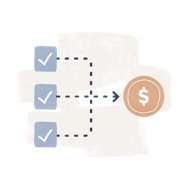Advertiser & Editorial Disclosure
We frequently get questions about how to get a business credit card, and if it’s a better fit than a personal credit card. They look similar, swipe the same and may even offer similar terms and rewards as personal credit cards, but business credit cards have a few distinct differences that can trip up a new business owner looking for a credit card.
Business credit cards can be a great way to build a credit history for your business, so finding the right one can be key to getting better interest rates on other business financing options down the road and even on securing partnerships (many businesses do credit checks on potential partners as a form of background check).
When it’s time to get a business credit card, it can be too easy to just fill out an application and click on the “submit” button. Instead, you need to take the time to do some research, learn about how small business credit cards work, and find the one that’s right for your company’s needs.
How to get a business credit card in 6 steps
- Check your credit scores. Your personal credit scores are a main determining factor behind which cards you will qualify for.
- Know an your annual income. You’ll be asked for your personal income on your business credit card application. This means any source of income, not just income your making from your business.
- Research available reward options. Does you travel frequently for business? Maybe a travel rewards business credit card is right for you. Do you need a card you can transfer existing debt onto? Consider a balance transfer card.
- Understand the rates you’ll be paying on your credit card debt. Business credit cards offer comparable APRs to that of personal credit cards, but APRs do vary by card and are influenced by your credit scores and income. If you are applying for a business charge card, make sure you understand the fees.
- Know the eligibility requirements for the card you select. In particular, you should know the credit score requirements for the card. If you end up getting denied, understand that multiple credit card applications over an extended period can damage your personal credit scores.
- Apply for the business credit card. You can use your SSN or an EIN for your business if you have one. If applying online, you’ll usually get a decision right away.
Here are eight things that you need to know before you apply for a business credit card.
1. You don’t need to be incorporated.
You might think that your company needs to be incorporated to apply for a small business credit card, but it doesn’t. You can apply for a small business credit card if you have an LLC, a partnership, or as a sole proprietor.
2. You don’t need an Employer Identification Number.
While business credit card applications will ask for your company’s Employer Identification Number (EIN), you won’t have one if you are operating as a sole proprietor. You can use your Social Security number (SSN) instead.
3. Business credit cards aren’t covered by the same rules as personal cards.
The CARD Act of 2009 created some new rules that credit card issuers had to follow, but it also carved out some major exceptions for business credit cards. For example, the CARD Act requires a minimum 21-day grace period (for cards that offer one). It also makes card issuers apply payments to the highest interest rate balances first and give customers a 45-day notice before raising rates on future charges. Yet small business credit cards are exempt from these requirements. Thankfully, many credit card issuers have chosen to voluntarily apply these rules to their small business cards.
4. Your personal credit will likely factor into whether you get approved.
Most small business credit cards are approved based on your personal credit score and require your personally guarantee to open an account. Some cards will report to your personal credit report, your business credit, or to both — here’s a quick cheat sheet on major issuers’ policies.
5. There are business credit cards for different types of credit.
Just as with personal credit cards, there are business credit cards that are tailored to your credit profile. For example, Capital One offers its Spark Classic card for small business owners with average credit. It has a annual fee, and offers a modest But for small business owners with excellent credit, Capital One offers the Spark Cash card that features with an annual fee of .
6. Business credit cards can offer promotional financing.
If you’re looking for a small business credit card to help you finance your company expenses, consider a card that offers an interest-free financing period. Small business credit cards can come with 0% APR introductory financing on new purchases, balance transfers, or both. For instance, the American Express Blue Business Plus card currently offers new applicants .
7. You can combine your business and personal rewards.
If you enjoy using your personal credit card to earn points and miles with your favorite airline or hotel loyalty program, you can add to your rewards with a small business credit card. When you apply for either a personal or a business credit card that’s co-branded with an airline or hotel, you will be asked for your loyalty program number. Since you’ll use the same number for the rewards you earn from both your business and personal credit cards, all of your points and miles will be pooled.
And if you’re earning rewards directly with a credit card program, you’ll also have your points combined. For example, the American Express Membership Rewards and the Chase Ultimate Rewards programs both allow you to combine the rewards you’ve earned from your personal and business credit cards.
8. A business credit card might duplicate the benefits of your personal credit card.
Many business credit cards are nearly identical to the personal version. For example, the Delta SkyMiles Reserve card from American Express comes in both a business and a personal version, each with a annual fee. Both cards offer priority service when flying Delta as well as access to their SkyClub lounges, regardless of which credit card you use to pay for your tickets. Therefore, you might want to think twice before getting both the business and personal versions of the same card.
Related card articles
Business Credit Cards for Bad Credit
3 Business Credit Cards With Great Hotel Perks
Which Credit Cards Can Help Me Build Business Credit?
Editor’s note: this article was originally published in August, 2017 and updated in June, 2018 by the Nav team.
This article was originally written on June 8, 2018 and updated on March 24, 2020.


Great info! Quick question: does opening a new small business credit card account effect my personal credit profile? For instance, will it somehow bring my personal credit score down the way a hard inquiry would?
Most small business credit cards do check the owner’s personal credit and it will create an inquiry on the credit report used. Inquiries generally only result in a drop of 3-7 points and they don’t affect credit scores after a year. (That impact is on personal credit scores. It’s generally not an issue for business credit scores.)
I was involving in such personal cards during my travel vacation in summer time. Personal card is really useful especially when you are in travel. You can really obtain more benefits of your personal card. I agree with that.